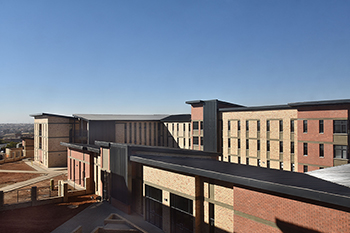
The residence has 146 double rooms with 17 kitchens
overall, each corridor has one kitchen. The residence
also has a gazellie and a conference room that
can accommodate 50 people.
Photo: Charl Devenish
The South Campus of the University of the Free State in Bloemfontein now has its own student residence. Completed in June 2016, the new residence can accommodate 250 undergraduate and 20 postgraduate students.
The residence has 270 beds, with 20 single-bedroom flats and 12 additional single rooms in the corridors. Each of these single-bedroom flats has a kitchen, lounge, and a bathroom. There are 146 double rooms with 17 kitchens overall, each corridor has one kitchen. The residence also has a gazellie, a conference room that can accommodate 50 people, as well as eight laundry rooms with a drying area.
“Students at the South Campus have, up until now, been commuting from the Bloemfontein Campus and residential areas around town. We are extremely proud that accommodation will now be available to our students on the campus. Although the official opening of the residence is said to take place early in 2017, some students have already moved in,” says Prof Daniella Coetzee, Principal of the South Campus.
The residence was built at a cost of R57 million, which was funded by the UFS and the Department of Higher Education and Training.
Residence accessible to differently-abled people
The UFS strives to cater for differently-abled people by making all its buildings accessible to them. This residence is no exception, as it has two rooms available on the ground floor of Block C for differently-abled students. These rooms accommodate two students per room.
A one-of-a-kind newly installed water system
The residence is also the first at the university that has a grey-water system installed. Grey water is made up of bath, shower, and bathroom sink water. The water will then be reused for toilet flushing as well as for irrigation purposes on the campus.